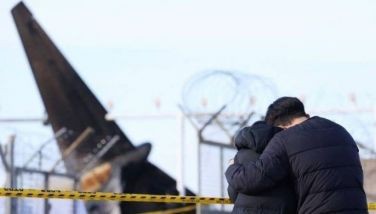UN rescinds invitation to Iran to attend talks
GENEVA — A last-minute U.N. invitation for Iran to join this week's Syria peace talks threw the long-awaited Geneva conference into doubt Monday, forcing U.N. chief Ban Ki-moon to rescind his offer under intense U.S. pressure after the opposition threatened to boycott.
With the invitation withdrawn, the main Western-backed opposition group said it would attend the talks aimed at ending Syria's ruinous three-year civil war. The opposition said the conference should seek to establish a transitional government with full executive powers "in which killers and criminals do not participate."
The surprise invitation, extended Sunday by the U.N. secretary-general, set off a flurry of diplomatic activity to salvage the talks. The U.S. said the offer should be rescinded, and the opposition threatened to skip the event entirely.
The conference is set to begin Wednesday in the Swiss luxury resort city of Montreux, with high-ranking delegations from the United States, Russia and close to 40 other countries attending. Face-to-face negotiations between the Syrian government and its opponents — the first of the uprising — are to start Friday in Geneva.
The uproar over Iran's invitation put the entire event at risk of being scuttled.
The Syrian National Coalition, which had voted late Saturday to attend after months of rancorous debate, issued an ultimatum, saying that Iran must commit publicly within hours to withdraw its "troops and militias" from Syria and abide by a 2012 roadmap to establish a transitional government. Otherwise, the group said, the U.N. should withdraw its invitation for Tehran to take part.
The confusion surrounding the Iranian invitation underscored the tenuous nature of the diplomatic effort to end the bloody conflict, which has morphed from peaceful protests into a vicious civil war with outside powers backing rebels who are fighting not only the government but rival insurgents as well.
It is not clear what exactly motivated Ban to issue the invitation, but it came hours after he said he had received assurances from Tehran that it accepted the premise of the talks.
Syria has been ruled by President Bashar Assad's family since 1970, and Iran is Assad's strongest regional ally, supplying his government with advisers, money and materiel since the uprising began in 2011. The Islamic Republic's allies, most notably the Lebanese Shiite militant group Hezbollah, have also gone to Syria to help bolster Assad's forces.
The last-minute invitation appeared to take the U.S. and its European allies by surprise. An Iranian statement said Iran had accepted the offer without "any pre-conditions."
Ban said he was "deeply disappointed" by Iran's statements Monday.
Senior U.S. officials said Iran has not met the criteria to participate in the conference unless it fully and publicly endorses the aims of the meeting.
Speaking to reporters in a conference call, the officials said public statements from Iran fall "well short" of what is require for Tehran's participation, adding that they expect the U.N. to reevaluate and reverse its decision unless Iran changes course.
The officials spoke on condition of anonymity because they were not authorized to discuss the matter using their names.
France, another strong supporter of the opposition coalition, took the same line, with the country's U.N. ambassador, Gerard Araud, saying Iran "must accept explicitly" the terms of the roadmap.
In New York, Russia's U.N. ambassador Vitaly Churkin said "of course" both the U.S. and Russia were consulted about the Iran invitation, and he said that if the Syrian opposition boycotts the talks, "that would be a big mistake."
In Tehran, Iranian Foreign Ministry spokeswoman Marzieh Afkham was quoted by the official IRNA news agency saying that Iran does not recognize the Geneva roadmap because it did not attend the conference that drafted it.
Saudi Arabia, a main backer of the Syrian opposition and a bitter regional rival of Tehran, also said Iran is not qualified to attend the conference but stopped short of threatening to boycott.
The negotiations aim to broker a political resolution to a conflict that has killed more than 130,000 people, displaced millions and put entire towns and neighborhoods under military siege in the worst humanitarian crisis in decades.
Diplomats and political leaders acknowledge that the prospects of achieving such a lofty goal any time soon are slim at best — with the opposition riveted by internal divisions. Infighting between rebels in northern Syria has killed more than 1,000 people in the past month.
Both the government and the opposition have suffered enormous losses, but even now, neither side appears desperate enough to budge from its entrenched position. At this point, just getting the antagonists into the same room to start what is expected to be a long process that could drag on for years would be perceived as a success.
Invitations to the one-day meeting of foreign ministers had been subject to approval by the initiating states, Russia and the United States, but the two countries had been at an impasse over Iran.
Syria's crisis began in the heyday of the Arab Spring uprisings that swept away authoritarian leaders in Egypt, Tunisia and Yemen. Unlike the others, Syria's leadership responded to largely peaceful protests for political reform with a withering crackdown. That slowly forced the opposition to take up arms and gave birth to a civil war that has also spawned a proxy battle between regional Shiite Muslim power Iran and Sunni heavyweight Saudi Arabia.
The cumulative effect of the war has been disastrous. Syria lies in ruins, its economy shattered, its rich social fabric shredded.
- Latest
- Trending
































